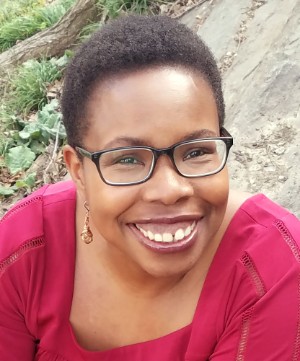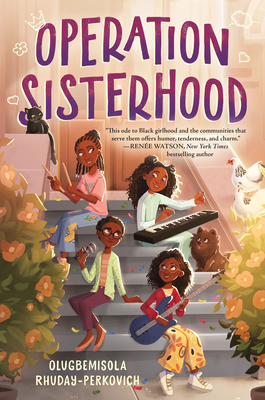The Magic of Just Being
by Olugbemisola Rhuday-Perkovich
 I love and celebrate Black Girl Magic and Black Excellence. I mean! Just look at us. We truly are extraordinary.
I love and celebrate Black Girl Magic and Black Excellence. I mean! Just look at us. We truly are extraordinary.
But sometimes … sometimes I know that I’m not always magical or excellent. Sometimes I’m just regular. And sometimes I’m worse. Sometimes I don’t even know.
And I have to let that be okay. I remind myself that I am made up of many stories—beautiful, powerful, messy, mysterious, painful, joyful, mistake-making, and yes, excellent, and magical. The kaleidoscope of Black stories reminds me that I don’t have to be anyone other than who I am—and gives me the space to dream of being who I wanted to be.
My mom was from Jamaica, my dad is from Nigeria, and I was born in New York. I grew up nourished by stories from my family of “back home,” of immigration, of my heritage and multiple ethnicities. Those were my favorite bedtime stories by far. From the moment I was born, my family gave me the precious gift of Black stories on our bookshelves, at the dinner table, at bedtime, from their own lives, from Black authors all across the Diaspora. All those stories helped me to understand that Black lives are beautiful, powerful, and dynamic and come in infinite flavors.
I was a big reader as a kid. I read to make meaning, to ask questions, to figure out what I thought, where I belonged. I read to laugh, to cry, to be comforted, to be empowered. I loved myths, folktales, origin stories, fables, realistic fiction, historical fiction, biography, and Encyclopaedia Britannica … I loved it all. Recently, I heard someone say that they were glad there were “new” narratives of the Black experience being told in children’s literature; but we’ve always told a variety of stories. Some communities weren’t and still aren’t ready to listen. But we speak, we play, we write, we sing, we paint, we create—we tell our stories anyway. Black people have a legacy of stories that is deep and wide and high and long. We have such deeply rich and powerful stories of ingenuity and innovation, endurance, triumph, struggle, and infinite joy. Despite systems that seek to deny it, Black people are rich in story—we drip in story.
 Many Black parents who have the resources and opportunity to homeschool do so because education systems and structures in the United States do not affirm Black lives. In Operation Sisterhood, the family “freeschools.” The parents want to raise the girls to be “free within themselves,” to paraphrase Langston Hughes—to love who they are, know they are loved as they are, and be fully who they can be. Even though I was not officially homeschooled and went to a lot of different types of schools, my parents, and many of the other Black parents we knew, believed in a kind of schooling outside of the school building, the kind that meant doing interpretive dances to “Young, Gifted, and Black” at annual Martin Luther King Jr. breakfasts, reciting the poems of Claude McKay at Thanksgiving, and memorizing the countries of the African continent with a puzzle. I learned about Black history and culture in many ways, through a variety of subjects and in everyday life, grounded in an understanding that Black children are capable, curious learners with a rich heritage to draw from.
Many Black parents who have the resources and opportunity to homeschool do so because education systems and structures in the United States do not affirm Black lives. In Operation Sisterhood, the family “freeschools.” The parents want to raise the girls to be “free within themselves,” to paraphrase Langston Hughes—to love who they are, know they are loved as they are, and be fully who they can be. Even though I was not officially homeschooled and went to a lot of different types of schools, my parents, and many of the other Black parents we knew, believed in a kind of schooling outside of the school building, the kind that meant doing interpretive dances to “Young, Gifted, and Black” at annual Martin Luther King Jr. breakfasts, reciting the poems of Claude McKay at Thanksgiving, and memorizing the countries of the African continent with a puzzle. I learned about Black history and culture in many ways, through a variety of subjects and in everyday life, grounded in an understanding that Black children are capable, curious learners with a rich heritage to draw from.
There are so many incredible educators out there doing wonderful work in spite of a system that often disrespects them and their students; I also had Black educators who went the extra mile to share Black stories in the classroom, and in conversation outside. Teachers like Barbara Glover, Geraldine Harris, and Lena Anderson in high school, and college professors like James Turner, Don Ohadike, William Branch, Wole Soyinka, and Locksley Edmondson were among those who shared Black playwrights, thinkers, filmmakers, artists, and more. It was so important to have them champion and cherish our lives and our stories in a world that so often did not.
Storysharing always creates new opportunities to listen. The stories we encounter, and the ones we create, end up in conversation with one another no matter what. In much the same way that I know for sure that all Black lives matter, I know that we can make room for all kinds of stories by Black people about Black life. There is so much beauty in all our lives and reading the world through stories by and about us gives us the opportunity to imagine, to remember and share. As Gwendolyn Brooks wrote: “We are each other’s harvest: we are each other’s business: we are each other’s magnitude and bond.” (from “Paul Robeson”)
So, let’s handle our business with great care. Because our story is precious. Our story is magical and beautiful, and it is most excellent, even when we’re not. Our story matters because we are.
